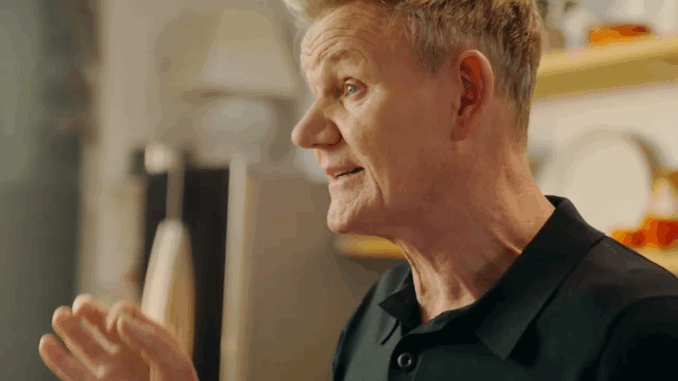
“Take a nice hefty fork of noodles,” Gordon Ramsay says, “and now we’re going to start building.”
“Sprinkle my veg in and around: look at that, beautiful. And then add a touch more noodles.”
Ramsay is in the middle of a YouTube tutorial on the Chef Woo channel, showing viewers how to make a chicken ramen bowl using the firm’s supermarket instant noodles.
Once you’ve added a second serving of noodles to the plate, “this is where the chicken comes in,” Gordon Ramsay says.
And after the chicken? Time for a third dollop of noodles. “And there we go. An absolutely delicious chicken noodle cup.
“And thanks to Chef Woo.”
The video, which has over 120,000 views, is one of several Ramsay has filmed for the channel in a partnership with its owner, US-listed Borealis Foods.
As part of his relationship with Borealis, Gordon Ramsay has built a stake in the company – but it’s not clear whether he bought the shares himself or was offered them as part of the sponsorship.
But while the TV star may have hoped to see the firm’s stock soar, his investment could yet prove to be another kitchen nightmare.
Play Video
‘Substantial doubt’
Borealis’ latest quarterly report, published several days late on Wednesday, showed the $30m-a-year turnover company has seen its cash reserves slip to less than $200k. CEO Reza Soltanzadeh has agreed to waive his salary for the quarter, such is the state of the firm’s cash crunch.
Borealis has incurred consecutive quarters of losses and negative cashflow, conditions which “raise substantial doubt about the company’s ability to continue as a going concern,” the report says, adding it was “actively evaluating” finance options. “If we cannot obtain adequate additional financing…we may have to substantially curtail or limit our research, marketing, production or distribution activities, sell assets of the company or seek protection from creditors under bankruptcy laws.”
So what prompted Gordon Ramsay’s foray into ramen? Several factors about the business may have given other investors pause for thought.
Borealis became listed on the New York Stock Exchange last year via a merger with a SPAC, Oxus Acquisition Corp, a Cayman Islands-based business which raised $173m after its 2021 float.
Oxus rode the pandemic-era SPAC wave, when investors would freely pour cash into blank cheque companies, a frenzy which has since died out – largely because so many of them went bankrupt.
Who was behind Oxus? Some names may ring a bell with investors back in Blighty.
Kazakh connection
The firm’s lead investor was Kazakhstani business magnate and crypto entrepreneur, Kenges Rackishev.
Rackishev made his fortune getting involved in mining, acquiring a major stake in London-listed Central Asia Metals before selling the shares for a hefty gain in 2018.
Before that, in 2014 he acquired the shares of Kazakh firm BTA Bank, which before his involvement was responsible for one of the world’s biggest financial frauds.
Rackishev, who is thought to be worth more than £1bn, is also an associate of Prince Andrew. According to a Daily Mail investigation, the popular royal had been in line for a £4m commission in 2011 after he “used his relationship with the Kazakh oligarch…to quietly help a Greek utility firm and a Swiss finance house bid for infrastructure contracts.”
Kenges, also a friend of Hunter Biden, reportedly helped Andrew sell his £15m Sunninghill Park home to his business partner, Kazakh oligarch Timur Kulibayev, who has had his own share of interesting business deals.
Also involved in Borealis is director Shukhrat Ibragimov, who last year became CEO of mining business Eurasian Resources Group. ERG was previously listed on the London Stock Exchange before delisting in 2013 after an investigation into the firm’s dealings by the UK’s Serious Fraud Office. A decade later, the SFO closed its case, concluding that it had insufficient admissible evidence to prosecute.
Cash crunch
Back to Borealis, and Gordon Ramsay’s Chef Woo. How well has it been performing since last year’s SPAC merger? It’s had its share of challenges.
According to the firm’s 2023 annual report, “it was determined that Oxus had material weaknesses…relating to its internal controls over financial reporting.”
A year later, in Borealis’ 2024 report, it transpired that the firm’s chair and CEO Soltanzadeh handed the firm a combined $800k to shore up its cash reserves, which by then had slipped from $7.6m to under $700k.
“Liquidity constraints continued to pose challenges,” the company said on Wednesday.
How did it end up so short on cash? The board’s decision to embark on a $3m share buyback programme midway through the year can’t have helped.
It’s not clear how much more cash the company has before it runs out, but it continues to trade reasonably strongly. Its latest quarterly report showed the company made $7.2m, down a nudge from the $8.5m it made the previous year.
Soltanzadeh told City AM in a statement: “We are confident about the future of the company, our IPs, brands and the wide-spread national distribution of our products which is expected to be monetized in the next few quarters. We will inform that market about the company’s latest developments including fund raising efforts.”
Why did Gordon Ramsay invest?
Borealis says its instant noodles are sold in 18,000 stores across the US, and the maker of the Asian noodle dish, known as Chef Woo, says it takes pride in its American heritage.
But the homepage of the company’s website, which is headed up by a huge video of an American flag fluttering in the wind and captioned “proudly made in America,” neglects to mention that the company, its head office and senior staff are all based in neighbouring Canada.
All of these factors combined were what motivated Gordon Ramsay to invest – presumably. City AM can’t say for sure, as the world-class chef declined to comment.